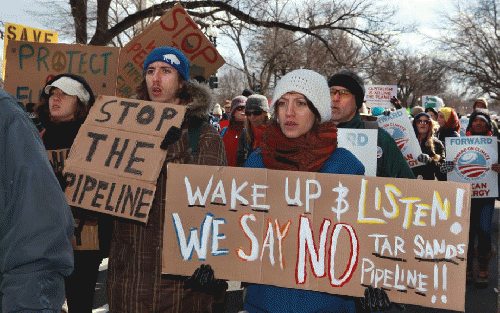Since establishing congressional control, Republicans have continued espousing dubious reasons for pushing legislation requiring construction of the northern section of the Keystone XL pipeline. It would snake from Alberta's tar sands through Montana, South Dakota, and Nebraska and connect with the already-built southern portion of the pipeline to refineries south of there that are capable of processing heavy crude.
Pipeline supporters contend it will supply oil for US use. Others say Canadian oil from Keystone XL would be channeled through the US for export to overseas markets. Pipeline owner TransCanada claims "Not one drop of crude from the Keystone XL would be exported."
Note use of the word "crude" by TransCanada. If the "crude" is all refined in the US and the resulting products exported, it may not be lying to say no "crude" will be exported. Nevertheless, would you find TransCanada's claim misleading since the refined product will be exported?
Saying no crude will be exported assumes US refineries will process it all. That assumption does not currently appear to be true. Gulf coast refineries are at or near full capacity now because of the abundance of fracked lighter oil coming from US wells.
To guarantee that oil flowing in Keystone XL will be used only by US consumers, Democrats proposed an amendment to the pipeline-construction legislation. However, when US Senator Ed Markey offered such an amendment as a Congressman, it was defeated. If the Democratic amendment is defeated again, it will strengthen the claim that oil carried by Keystone will be exported. Otherwise, why defeat a US domestic-use requirement?
Teamster supporters of Keystone XL are now saying building it will create 42,000 jobs. In contrast, Cornell University's Global Labor Institute calculated that KXL will produce 304 to 838 full-time equivalent, temporary jobs in Montana, South Dakota, and Nebraska plus some overseas, over the two-year construction phas e. The US State Department estimates 4,000 construction jobs will be added. To put the Cornell Institute's 838 jobs number in perspective, 23-times that many (20,000) construction jobs were added in the US in November 2014.
According to the State Department, 35 permanent jobs plus 15 permanent part-time positions also will be created if Keystone is built. Maine's independent US Senator, Angus King, concludes: "A new McDonalds in Fargo, North Dakota, would add more than 35 permanent jobs."
Even though it is supposed to be a jobs bill, several unions oppose Keystone. Transit unions like the Amalgamated Transit Union will likely lose jobs if Keystone XL is built because crude now moved by rail will begin flowing through the pipeline. Unless I've missed it, the question of how many permanent transportation jobs would be lost if Keystone is built is not being discussed by the Teamsters. That number has to exceed 35.
Healthcare unions like National Nurses United, 1199 SEIU Health Care Workers East, and New York State Nurses Association oppose Keystone because the added jobs come with a price affecting human health that is too high.
Burning more oil will increase asthma rates and heat up the climate.
Climate change has enlarged the range of disease-bearing insects that once thrived only in warmer climates. In Africa, malaria kills a child every 30 seconds. Climate change will expand the habitat of the tropical mosquitoes that carry malaria, adding 80 million cases annually to that toll. In 1933, malaria infected 30% of the Tennessee Valley Authority's inhabitants. Spraying of DDT, which is no longer considered safe, eradicated malaria in the US by 1951. However, if climate change produces the warming and torrential rains that exacerbate stagnant water pools, malaria could return.
As our climate warms, expanding the range of ticks, Lyme Disease is increasing (mostly in the eastern US) by an average of 2,000 cases a year. It costs approximately $89,000 to treat a case of Lyme Disease.
Suppose the Keystone XL Pipeline will produce $18,240,000 to $240,000,000 in wages ($60,000/job; 304 to 4,000 jobs) a year during the construction phase. The $178,000,000 cost of treating 2,000 added US cases of Lyme Disease and additional costs of other Tar Sands-driven health effects every year will soon outweigh any Keystone wage benefit.(Article changed on January 14, 2015 at 22:58)
(Article changed on January 14, 2015 at 23:01)






